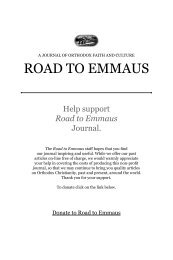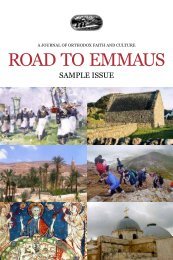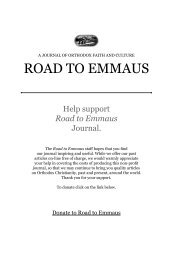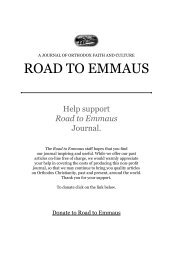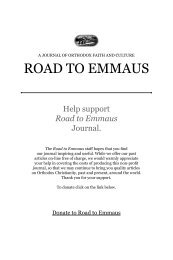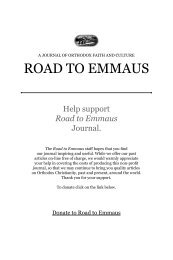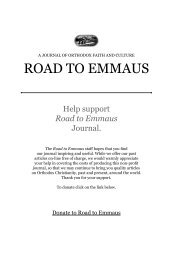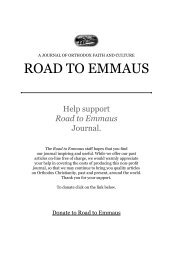Banished Faith: The Exile of Christian Pontus - Road to Emmaus ...
Banished Faith: The Exile of Christian Pontus - Road to Emmaus ...
Banished Faith: The Exile of Christian Pontus - Road to Emmaus ...
You also want an ePaper? Increase the reach of your titles
YUMPU automatically turns print PDFs into web optimized ePapers that Google loves.
<strong>Road</strong> <strong>to</strong> <strong>Emmaus</strong> Vol. IX, No. 1 (#32)BANISHED FAITH<strong>Christian</strong> faith. <strong>The</strong> metropolitan advised them <strong>to</strong> wait, so that he wouldn’tbe accused <strong>of</strong> proselytism if Trebizond was retaken by the Turks. With thefortunes <strong>of</strong> war, their conversion never came about, and whether therequest was sincere or not, we will never know. 5<strong>The</strong> Russian occupation ended in 1918 and, after the Russian Revolution,Lenin returned Karskaya Oblast <strong>to</strong> Turkey. Topal Osman rode in<strong>to</strong>Trebizond soon after the Russian withdrawal with a hundred zipcali (armedfighters), intending <strong>to</strong> destroy the <strong>Christian</strong>s. He made the c<strong>of</strong>fee house <strong>of</strong>Tefik his headquarters, saying, “I have an ‘invoice’ <strong>to</strong> finish this place <strong>of</strong>f inthree days.” <strong>The</strong> city’s high-ranking Turks formed a committee and went <strong>to</strong>Osman saying, “If the <strong>Christian</strong>s here need <strong>to</strong> be killed, we can do it ourselves,we don’t need you. Bishop Chrysanthos rescued our people; if youlove your own life, go away.” He gathered his troops and left.Metropolitan Chrysanthos later became Archbishop <strong>of</strong> Athens and AllGreece (1938-1941), only <strong>to</strong> be deposed during World War II for his refusal<strong>to</strong> acknowledge the German occupation <strong>of</strong> Greece, publicly declaring, “Thisgovernment does not represent the Greek people.” Nor did he try <strong>to</strong> recoverhis position after the war, telling his supporters that the Church shouldremain at peace <strong>to</strong> fulfill her destiny.<strong>The</strong> Turkish WomanParthena Eleftheriadou, who was quoted above, also spoke <strong>of</strong> the Turkishevacuation <strong>of</strong> Trebizond during the Russian occupation: “One afternoon Ifound a Turkish woman sitting on the front steps <strong>of</strong> our house. I was <strong>to</strong>uchedby her sorrow and went in and <strong>to</strong>ld my mother, “A Turkish woman is outsidecrying, but she doesn’t look like a beggar.” My mother brought her in<strong>to</strong> ourhouse and tried <strong>to</strong> calm her, telling her that her husband would return. Shestayed with us for 19 months. <strong>The</strong> only way in<strong>to</strong> Trebizond was past ourhouse, and when the Turks finally returned, this woman sat at the windowevery day for weeks, watching them pass. Finally her husband came as well.I wouldn’t have spoken about this because when you do something goodyou should always throw it in<strong>to</strong> the sea, but there is another part <strong>to</strong> thiss<strong>to</strong>ry. When our time came <strong>to</strong> leave in 1923, our men were not back yet from5 Ed. note: According <strong>to</strong> one contemporary Russian source, as late as 1917, when Trebizond was occupiedby Russian troops, Russian military committees went from house <strong>to</strong> house commandeering living space. Onseveral occasions, they were begged for clemency by prominent Muslim Turks, who, declaring themselves<strong>Christian</strong>, showed hidden family icons or, more rarely, entire concealed chapels.their places <strong>of</strong> exile. We had no one <strong>to</strong> help us and who knows what wouldhave become <strong>of</strong> us, except that the husband <strong>of</strong> this Turkish lady himselfbrought all <strong>of</strong> our goods <strong>to</strong> the ship <strong>to</strong> Greece.”<strong>The</strong> White Death MarchesIn November <strong>of</strong> 1919, after recovering the Turkish Black Sea coast, theTurks initiated a secret plan called White Death: forced death marches <strong>of</strong>the <strong>Christian</strong> population from Tripolis <strong>to</strong> Samsun, Sinope and Bafra oversnow-covered mountains. According <strong>to</strong> a German military attaché, IsmailEnver, the Turkish Ot<strong>to</strong>man Minister, had declared in 1915 that he would“solve the Greek problem during the war… in the same way he believed hesolved the Armenian problem.” 6 Persecutions, massacres, and forced starvationmarches in <strong>Christian</strong> areas continued sporadically throughoutTurkey until the Exchange <strong>of</strong> Populations in 1923, particularly escalatingafter the Allied-backed Greek occupation <strong>of</strong> Smyrna. <strong>The</strong> tragic deaths <strong>of</strong>hundreds <strong>of</strong> thousands <strong>of</strong> Pontian <strong>Christian</strong>s was chronicled by contemporaryforeign ambassadors <strong>to</strong> Turkey and many outside witnesses.One example <strong>of</strong> this was the village <strong>of</strong> Espye near the Black Sea coast.Turkish authorities arrived on Sunday, November 16, 1919 and called the village’s483 <strong>Christian</strong>s <strong>to</strong> the Church <strong>of</strong> St. George. “Because we are at war with<strong>Christian</strong> Russia, for your own safety, the government has decided that youwill leave the coast and move fifty kilometers inland. Don’t take many things.<strong>The</strong> fighting will be over soon and you will return. <strong>The</strong> government guaranteesthe safety <strong>of</strong> your homes and belongings. Because you are Turkish citizens,food and shelter will be provided for you along the way and at your destination.”<strong>The</strong> fifty kilometers, however, turned <strong>to</strong> five hundred, and therewas little food and no shelter except what the exiles found along the road.Espye’s Muslims were horrified by the uprooting <strong>of</strong> their neighbors andfriends, families with whom they had lived and worked for generations. Anhour after the Greeks left Espye, the tseteler arrived on horseback, brokedown the doors <strong>of</strong> the Greek homes, <strong>to</strong>ok what they wanted, and burnt thehouses <strong>to</strong> the ground. When Ibrahim, a Muslim village elder and life-longfriend <strong>of</strong> Espye’s Greek Orthodox priest, Papa Ioannis Kotrides, saw themlooting the priest’s house, he left his yard and approached the vandals, say-6 Quoted by Niall Ferguson, <strong>The</strong> War <strong>of</strong> the World: Twentieth-Century Conflict and the Descent <strong>of</strong> theWest, NY, Penguin Press, 2006, p. 180.1617



